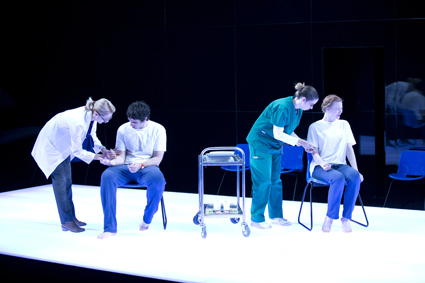Love vs Big Pharma
Keith Gallasch: Lucy Prebble, The Effect

Angie Milliken, Mark Leonard Winter, Amy Burkett, Anna McGahan The Effect, STC/QTC co-production
photo Lisa Tomasetti
Angie Milliken, Mark Leonard Winter, Amy Burkett, Anna McGahan The Effect, STC/QTC co-production
UK playwright Lucy Prebble’s award-winning The Effect is being widely produced (an MTC production is playing in tandem with STC’s). It’s an ‘issue’ play that directly addresses the morality of drug trials from both sides—the medical professionals and their subjects. Prebble neatly pairs her protagonists. The head researcher, a pragmatic male psychiatrist has employed a female psychotherapist friend to run the trial. There’s a mere hint of something odd in their relationship, but this is irritatingly left hanging until the second of the play’s two acts.
Much of the first act focuses on a young man, a sardonic live wire, not particularly educated and an old hand at these tests and how to get around their restrictions. He’s attracted to a young woman, a psychology student, a rationalist who is in a relationship but has doubts about love. His playful insistence, the rarefied atmosphere of the trial (no communication with the outside world, no sex) and not knowing who is taking the mood enhancing drug and who the placebo breeds intimacy at first and then anxiety—is the man’s feeling of love for the woman natural? He believes he’s on the placebo, so it must be. When the truth is known, chaos ensues: the psychotherapist loses control of the test and of her own mental well-being, her damaged relationship with the psychiatrist is revealed and the young couple enter into a post-trial relationship of complex emotional and physical dependency. It’s an unhappy happy ending.
It’s disturbing that the clinicians in the play completely remove their subjects from the real world when testing drugs whose efficacy can only be determined socially. So, in an un-real clinical setting it’s not surprising that emotions and motives are suspect or warped. It’s likewise unsurprising that a psychotherapist will find a psychiatric model unaccommodating. But these tensions drive the play, providing a modicum of suspense, two mighty shocks and much to consider. The play is convincingly staged in a super-modern clinic: black walls with a mirroring sheen and a centre-stage low, wide platform—a light box-cum-specimen table that illuminates this detached world with unnatural colour. Overhead hang several video monitors indicating trial stages and readings while a spooky laboratory hum pervades the space. Brittle human behaviour sits at odds with the architectural and technological certainty of the clinic.
Although Prebble’s critique of rarified drug trialling is lucid, her treatment of her characters is less convincing. I’ve already mentioned the Act 2 revelations about the psychiatrist and the physiotherapist, which require awkward exposition. More problematic is the punishing treatment doled out to the psychotherapist—to what end thematically? It’s established that she was emotionally troubled before she met the psychiatrist in their earlier years, then subsequent to their parting and again now—wheelchair bound even. What has changed? While the young couple’s interaction—his carefree, idiosyncratic dancing and her growing sense of freedom in his presence—convinces both emotionally and in terms of the drug testing issue, the other couple’s doesn’t add up. Yes, he, the good corporate citizen, defends his testing methods and she finally objects to them, but her reactions come to nothing and he feels let off the hook—she doesn’t blame him for her breakdown. We learn nothing of her actual condition and he’s pretty much a cipher. The young couple on the other hand grow in complexity as the trialling becomes exacting, until they finally face a tragic reversal of their roles. The young in The Effect survive, if damaged and changed; their elders are locked in, he as the head of an institution, she institutionalised. Is that all Prebble has to say?
Sarah Goodes’ direction is effective, making good use of the spacious hi-tech design by Renee Mulder with lighting by Ben Hughes and sound by Guy Webster. Angie Milliken as the psychotherapist is adept at revealing confusion and pain in a limited role; Eugene Gilfedder is a quietly charming, emotionally armoured psychiatrist; Anna McGahan ably captures the transformation of a restrained young woman by a violent act that yields her subsequent frankness and caring; and Mark Leonard Winter as the young man is disarmingly all loose energy, trickery and passion.
Sydney Theatre Company, The Effect, writer Lucy Prebble, director Sarah Goodes; Wharf 1, STC, opened 12 July
RealTime issue #122 Aug-Sept 2014 pg. web






